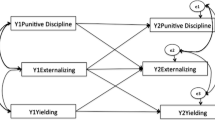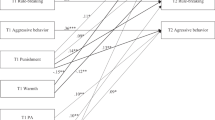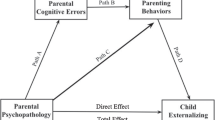Abstract
Examined a cognitive-behavioral pathway by which depressive symptoms in mothers and fathers increase risk for later child externalizing problem behavior via parents’ appraisals of child behavior and physical discipline. Participants were 245 children (118 girls) at risk for school-age conduct problems, and their parents and teachers. Children were approximately 3 years old at Time 1 (T1) and 5 ½ years old at Time 2 (T2). At T1, mothers and fathers reported their depressive symptoms, perceptions of their child’s reciprocal affection and responsiveness, frequency of physical punishment, and child externalizing problems. Mothers, fathers, and teachers provided ratings of externalizing behavior at T2. Structural equation modeling revealed that parents’ negative attributions mediated positive relations between their depressive symptoms and frequency of physical punishment for both fathers and mothers. More frequent physical punishment, in turn, predicted increased child externalizing behavior at T2. In future research, transactional mechanisms underlying effects of clinical depression on child conduct problems should be explored at multiple stages of development. For parents showing depressive symptoms, restructuring distorted perceptions about their children’s behavior may be an important component of intervention programs.


Similar content being viewed by others
References
Abidin, R. (1995). Parenting stress index: Professional manual (3rd ed.). Odessa: Psychological Assessment Resources.
Achenbach, T. M. (1992). Manual for child behavior checklist/2–3 and 1992 profile. Burlington: University of Vermont, Department of Psychiatry.
Achenbach, T. M., & Rescorla, L. A. (2001). Manual for ASEBA school-age forms & profiles. Burlington: University of Vermont, Research Center for Children, Youth, & Families.
Afifi, T. O., Brownridge, D. A., Cox, B. J., & Sareen, J. (2006). Physical punishment, childhood abuse and psychiatric disorders. Child Abuse & Neglect, 30, 1093–1103.
Alloy, L., Abramson, L., Metalsky, G., & Hartlage, S. (1988). The hopelessness theory of depression: attributional aspects. British Journal of Clinical Psychology, 27, 5–21.
Ateah, C. A., & Durrant, J. E. (2005). Maternal use of physical punishment in response to child misbehavior: implications for child abuse prevention. Child Abuse & Neglect, 29, 169–185.
Bailey, J. A., Hill, K. G., Oesterle, S., & Hawkins, J. D. (2009). Parenting practices and problem behavior across three generations: monitoring, harsh discipline, and drug use in the intergenerational transmission of externalizing behavior. Developmental Psychology, 45, 1214–1226.
Beardslee, W., Wright, E., Gladstone, T., & Forbes, P. (2007). Long-term effects from a randomized trial of two public health preventive interventions for parental depression. Journal of Family Psychology, 21, 703–713.
Beauchaine, T. P., Webster-Stratton, C., & Reid, M. J. (2005). Mediators, moderators, and predictors of 1-year outcomes among children treated for early-onset conduct problems: a latent growth curve analysis. Journal of Consulting and Clinical Psychology, 73, 371–388.
Beck, A.T. (1967). Depression: clinical, experimental, and theoretical aspects. New York: Hoeber. Republished as Depression: Causes and treatment. Philadelphia: University of Pennsylvania Press.
Biederman, J., Faraone, S. V., Hirshfeld-Becker, D. R., Friedman, D., Robin, J. A., & Rosenbaum, J. F. (2001). Patterns of psychopathology and dysfunction in high-risk children of parents with panic disorder and major depression. The American Journal of Psychiatry, 158, 49–57.
Bolton, C., Calam, R., Barrowclough, C., Peters, S., Roberts, J., Wearden, A., et al. (2003). Expressed emotion, attributions and depression in mothers of children with problem behaviour. Journal of Child Psychology and Psychiatry and Allied Disciplines, 44, 242–254.
Boyle, M. H., & Pickles, A. R. (1997). Influence of maternal depressive symptoms on ratings of childhood behavior. Journal of Abnormal Child Psychology, 25, 399–412.
Brennan, P. A., Hammen, C., Andersen, M. J., Bor, W., Najman, J. M., & Williams, G. M. (2000). Chronicity, severity, and timing of maternal depressive symptoms: relationships with child outcomes at age 5. Developmental Psychology, 36, 759–766.
Bugental, D. (2009). Predicting and preventing child maltreatment: A biocognitive transactional approach. In A. J. Sameroff (Ed.), The transactional model of development: How children and contexts shape each other (pp. 97–115). Washington, DC: American Psychological Association.
Bugental, D., Ellerson, P., Lin, E. K., Rainey, B., Kokotovic, A., & O’Hara, N. (2002). A cognitive approach to child abuse prevention. Journal of Family Psychology, 16, 243–258.
Bugental, D. B., & Happaney, K. (2004). Predicting infant maltreatment in low-income families: the interactive effects of maternal attributions and child status at birth. Developmental Psychology, 40, 234–243.
Bugental, D. B., Johnston, C., New, M., & Silvester, J. (1998). Measuring parental attributions: conceptual and methodological issues. Journal of Family Psychology, 12, 459–480.
Burt, S. A., Krueger, R. F., McGue, M., & Iacono, W. (2003). Parent-child conflict and the comorbidity among childhood externalizing disorders. Archives of General Psychiatry, 60, 505–513.
Campbell, S. (1995). Behavior problems in preschool children: a review of recent research. Journal of Child Psychology and Psychiatry, 36, 113–149.
Campbell, S., Shaw, D., & Gilliom, M. (2000). Early externalizing behavior problems: toddlers and preschoolers at risk for later maladjustment. Development and Psychopathology, 12, 467–488.
Cassano, M., Adrian, M., Veits, G., & Zeman, J. (2006). The inclusion of fathers in the empirical investigation of child psychopathology: an update. Journal of Clinical Child and Adolescent Psychology, 35, 583–589.
Chi, T. C., & Hinshaw, S. P. (2002). Mother-child relationships of children with ADHD: the role of maternal depressive symptoms and depression-related distortions. Journal of Abnormal Child Psychology, 30, 387–400.
Combs-Ronto, L. A., Olson, S. L., Lunkenheimer, E. S., & Sameroff, A. J. (2009). Interactions between maternal parenting and children’s early disruptive behavior: bidirectional associations across the transition from preschool to school entry. Journal of Abnormal Child Psychology, 37, 1151–1163.
Connell, A. M., & Goodman, S. H. (2002). The association between psychopathology in fathers versus mothers and children’s internalizing and externalizing behavior problems: a meta-analysis. Psychological Bulletin, 128, 746–773.
Crick, N. R., & Dodge, K. A. (1994). A review and reformulation of social information-processing mechanisms in children’s social adjustment. Psychological Bulletin, 115, 74–101.
Cummings, E. M., & Davies, P. T. (1994). Maternal depression and child development. Journal of Child Psychology and Psychiatry and Allied Disciplines, 35, 73–112.
Cummings, E. M., Keller, P. S., & Davies, P. T. (2005). Towards a family process model of maternal and paternal depressive symptoms: exploring multiple relations with child and family functioning. Journal of Child Psychology and Psychiatry, 46, 479–489.
Derogatis, L. R. (1993). Brief symptom inventory: Administration, scoring, and procedures manual. Minneapolis: National Computer Systems, Inc.
Derogatis, L., & Melisaratos, N. (1983). The Brief Symptom Inventory: An introductory report. Psychological Medicine: A Journal of Research in Psychiatry and the Allied Sciences, 13, 595–605.
Dix, T., & Meunier, L. N. (2009). Depressive symptoms and parenting competence: an analysis of 13 regulatory processes. Developmental Review, 29, 45–68.
Dodge, K. A., Pettit, G. S., & Bates, J. E. (1994). Socialization mediators of the relation between socioeconomic status and child conduct problems. Child Development, 65, 649–665.
Earls, F. (1980). Prevalence of behavior problems in 3-year-old children: a cross-national replication. Archives of General Psychiatry, 37, 1153–1157.
Elgar, F. J., Mills, R. S. L., McGrath, P. J., Waschbusch, D. A., & Brownridge, D. A. (2007). Maternal and paternal depressive symptoms and child maladjustment: the mediating role of parental behavior. Journal of Abnormal Child Psychology, 35, 943–955.
Field, T., Morrow, C., & Adlestein, D. (1993). Depressed mothers’ perceptions of infant behavior. Infant Behavior & Development, 16, 99–108.
Gershoff, E. T. (2002). Corporal punishment by parents and associated child behaviors and experiences: a meta-analytic and theoretical review. Psychological Bulletin, 128, 539–579.
Goodman, S. H. (2007). Depression in mothers. Annual Review of Clinical Psychology, 3, 107–135.
Goodman, S. H., & Gotlib, I. H. (1999). Risk for psychopathology in the children of depressed mothers: a developmental model for understanding mechanisms of transmission. Psychological Review, 106, 458–490.
Hart, C. H., & Robinson, C. C. (1994). Comparative study of maternal and paternal disciplinary strategies. Psychological Reports, 74, 495–498.
Haskett, M. E., Scott, S. S., Grant, R., Ward, C. S., & Robinson, C. (2003). Child-related cognitions and affective functioning of physically abusive and comparison parents. Child Abuse & Neglect, 27, 663–686.
Holden, G. W., & Edwards, L. A. (1989). Parental attitudes toward child rearing: instruments, issues, and implications. Psychological Bulletin, 106, 29–58.
Holmbeck, G. (1997). Toward terminological, conceptual, and statistical clarity in the study of mediators and moderators: Examples from the child-clinical and pediatric psychology literatures. Journal of Consulting and Clinical Psychology, 65, 599–610.
Johnson, J. G., Cohen, P., Chen, H. N., Kasen, S., & Brook, J. S. (2006). Parenting behaviors associated with risk for offspring personality disorder during adulthood. Archives of General Psychiatry, 63, 579–587.
Johnston, C., Chen, M., & Ohan, J. (2006). Mothers’ attributions for behavior in nonproblem boys, boys with attention deficit hyperactivity disorder, and boys with attention deficit hyperactivity disorder and oppositional defiant behavior. Journal of Clinical Child and Adolescent Psychology, 35, 60–71.
Johnston, C., Hommersen, P., & Seipp, C. (2009). Maternal attributions and child oppositional behavior: a longitudinal study of boys with and without attention-deficit/hyperactivity disorder. Journal of Consulting and Clinical Psychology, 77, 189–195.
Kane, P., & Garber, J. (2004). The relations among depression in fathers, children’s psychopathology, and father-child conflict: a meta-analysis. Clinical Psychology Review, 24, 339–360.
Kendziora, K., & O’Leary, S. (1993). Dysfunctional parenting as a focus for prevention and treatment of child behavior problems. Advances in Clinical Child Psychology, 15, 175–206.
Kessler, R. C. (2003). Epidemiology of women and depression. Journal of Affective Disorders, 74, 5–13.
Kim-Cohen, J., Moffitt, T. E., Taylor, A., Pawlby, S. J., & Caspi, A. (2005). Maternal depression and children’s antisocial behavior: nature and nurture effects. Archives of General Psychiatry, 62, 173–181.
Larsson, H., Viding, E., Rijsdijk, F. V., & Plomin, R. (2008). Relationships between parental negativity and childhood antisocial behavior over time: a bidirectional effects model in a longitudinal genetically informative design. Journal of Abnormal Child Psychology, 36, 633–645.
Leung, D. W., & Slep, A. M. S. (2006). Predicting inept discipline: the role of parental depressive symptoms, anger, and attributions. Journal of Consulting and Clinical Psychology, 74, 524–534.
Lorber, M. F., & O’Leary, S. G. (2005). Mediated paths to overreactive discipline: mothers' experienced emotion, appraisals, and physiological responses. Journal of Consulting and Clinical Psychology, 73, 972–981.
Lovejoy, M. C., Graczyk, P. A., O'Hare, E., & Neuman, G. (2000). Maternal depression and parenting behavior: a meta-analytic review. Clinical Psychology Review, 20, 561–592.
Luoma, I., Tamminen, T., Kaukonen, P., Laippala, P., Puura, K., Salmelin, R., et al. (2001). Longitudinal study of maternal depressive symptoms and child well-being. Journal of the American Academy of Child and Adolescent Psychiatry, 40, 1367–1374.
Lynch, S. K., Turkheimer, E., D'Onofrio, B. M., Mendle, J., Emery, R. E., Slutske, W. S., et al. (2006). A genetically informed study of the association between harsh punishment and offspring behavioral problems. Journal of Family Psychology, 20, 190–198.
McCarty, C. A., & McMahon, R. J. (2003). Mediators of the relation between maternal depressive symptoms and child internalizing and disruptive behavior disorders. Journal of Family Psychology, 17, 545–556.
Milner, J. S. (2003). Social information processing in high-risk and physically abusive parents. Child Abuse & Neglect, 27, 7–20.
Montes, M. P., de Paul, J., & Milner, J. S. (2001). Evaluations, attributions, affect, and disciplinary choices in mothers at high and low risk for child physical abuse. Child Abuse & Neglect, 25, 1015–1036.
Morlan, K., & Tan, S. (1998). Comparison of the brief psychiatric rating scale and the brief symptom inventory. Journal of Clinical Psychology, 54, 885–894.
Najman, J. M., Williams, G. M., Nikles, J., Spence, S., Bor, W., O'Callaghan, M., et al. (2000). Mothers' mental illness and child behavior problems: cause-effect association or observation bias? Journal of the American Academy of Child and Adolescent Psychiatry, 39, 592–602.
Nobes, G., Smith, M., Upton, P., & Heverin, A. (1999). Physical punishment by mothers and fathers in British homes. Journal of Interpersonal Violence, 14, 887–902.
Olson, S. L., Bates, J. E., & Bayles, K. (1982). Maternal perceptions of infant and toddler behavior: a longitudinal, construct validation study. Infant Behavior & Development, 5, 397–410.
Olson, S. L., Bates, J. E., Sandy, J. M., & Schilling, E. M. (2002). Early developmental precursors of impulsive and inattentive behavior: from infancy to middle childhood. Journal of Child Psychology and Psychiatry, 43, 435–447.
Olson, S., Sameroff, A., Kerr, D., Lopez, N., & Wellman, H. (2005). Developmental foundations of externalizing problems in young children: the role of effortful control. Development and Psychopathology, 17, 25–45.
Olson, S., Sameroff, A., Lunkenheimer, E., & Kerr, D. (2009). Self-regulatory processes in the development of disruptive behavior problems: the preschool-to-school transition. Biopsychosocial regulatory processes in the development of childhood behavioral problems (pp. 144–185). New York, NY US: Cambridge University Press.
Pfiffner, L., McBurnett, K., Rathouz, P., & Judice, S. (2005). Family correlates of oppositional and conduct disorders in children with attention deficit/hyperactivity disorder. Journal of Abnormal Child Psychology, 33, 551–563.
Phares, V., Lopez, E., Fields, S., Kamboukos, D., & Duhig, A. M. (2005). Are fathers involved in pediatric psychology research and treatment? Journal of Pediatric Psychology, 30, 631–643.
Preacher, K. J., & Hayes, A. F. (2008). Asymptotic and resampling strategies for assessing and comparing indirect effects in multiple mediator models. Behavior Research Methods, 40, 879–891.
Ramchandani, P., Stein, A., Evans, J., O'Connor, T. G., & Team, A. S. (2005). Paternal depression in the postnatal period and child development: a prospective population study. Lancet, 365, 2201–2205.
Richters, J. E. (1992). Depressed mothers as informants about their children: a critical review of the evidence for distortion. Psychological Bulletin, 112, 485–499.
Riggins-Caspers, K. M., Cadoret, R. J., Knutson, J. F., & Langbehn, D. (2003). Biology-environment interaction and evocative biology-environment correlation: contributions of harsh discipline and parental psychopathology to problem adolescent behaviors. Behavior Genetics, 33, 205–220.
Sameroff, A. J. (Ed.). (2009). The transactional model of development: How children and contexts shape each other. Washington, DC: American Psychological Association.
Sandberg, J. F., & Hofferth, S. L. (2001). Changes in children's time with parents: United States, 1981–1997. Demography, 38, 423–436.
Sanders, M. R., Pidgeon, A. M., Gravestock, F., Connors, M. D., Brown, S., & Young, R. W. (2004). Does parental attributional retraining and anger management enhance the effects of the triple P-positive parenting program with parents at risk of child maltreatment? Behavior Therapy, 35, 513–535.
Schafer, J. L., & Graham, J. W. (2002). Missing data: our view of the state of the art. Psychological Methods, 7, 147–177.
Shaw, D., & Bell, R. (1993). Developmental theories of parental contributors to antisocial behavior. Journal of Abnormal Child Psychology, 21, 493–518.
Slep, A. M. S., & O'Leary, S. G. (1998). The effects of maternal attributions on parenting: an experimental analysis. Journal of Family Psychology, 12, 234–243.
Slep, A., & O'Leary, S. (2007). Multivariate models of mothers' and fathers' aggression toward their children. Journal of Consulting and Clinical Psychology, 75, 739–751.
Snarr, J. D., Slep, A. M. S., & Grande, V. P. (2009). Validation of a new self-report measure of parental attributions. Psychological Assessment, 21, 390–401.
Snyder, J., Cramer, A., Afrank, J., & Patterson, G. R. (2005). The contributions of ineffective discipline and parental hostile attributions of child misbehavior to the development of conduct problems at home and school. Developmental Psychology, 41, 30–41.
Somerset, W., Newport, D. J., Ragan, K., & Stowe, Z. N. (2006). Depressive disorders in women: From menarche to beyond the menopause. In C. L. M. Keyes & S. H. Goodman (Eds.), Women and depression: A handbook for the social, behavioral, and biomedical sciences (pp. 62–88). New York: Cambridge University Press.
Taylor, A. B., MacKinnon, D. P., & Tein, J. Y. (2008). Tests of the three-path mediated effect. Organizational Research Methods, 11, 241–269.
Tremblay, R. E. (2004). The development of human physical aggression: How important is early childhood? In L. A. Leavitt & D. M. B. Hall (Eds.), Social and moral development: Emerging evidence on the toddler years (pp. 221–238). Brunswick: Johnson & Johnson Pediatric Institute.
Webster-Stratton, C., & Hammond, M. (1988). Maternal depression and its relationship to life stress, perceptions of child behavior problems, parenting behaviors, and child conduct problems. Journal of Abnormal Child Psychology, 16, 299–315.
White, C., & Barrowclough, C. (1998). Depressed and non-depressed mothers with problematic preschoolers: attributions for child behaviours. British Journal of Clinical Psychology, 37, 385–398.
Wilson, C., Gardner, F., Burton, J., & Leung, S. (2006). Maternal attributions and young children's conduct problems: a longitudinal study. Infant and Child Development, 15, 109–121.
Wilson, C., & White, C. (2006). A preliminary investigation of the effect of intervention on parental attributions and reported behaviour. Behavioural and Cognitive Psychotherapy, 34, 503–507.
World Health Organization. (2008). The global burden of disease: 2004 update. Geneva: Author.
Author information
Authors and Affiliations
Corresponding author
Additional information
This research was supported by a grant from the National Institute of Mental Health (RO1MH57489) to Sheryl Olson and Arnold Sameroff. We are very grateful to the children, parents, teachers, and preschool administrators who participated, and to the many individuals who gave us invaluable help with data collection and coding, especially Gail Benninghoff and Meribeth Gandy Pezda. We also thank the administrators of the University of Michigan Children’s Center for their generous assistance.
An erratum to this article can be found at http://dx.doi.org/10.1007/s10802-011-9585-4.
Rights and permissions
About this article
Cite this article
Callender, K.A., Olson, S.L., Choe, D.E. et al. The Effects of Parental Depressive Symptoms, Appraisals, and Physical Punishment on Later Child Externalizing Behavior. J Abnorm Child Psychol 40, 471–483 (2012). https://doi.org/10.1007/s10802-011-9572-9
Published:
Issue Date:
DOI: https://doi.org/10.1007/s10802-011-9572-9




